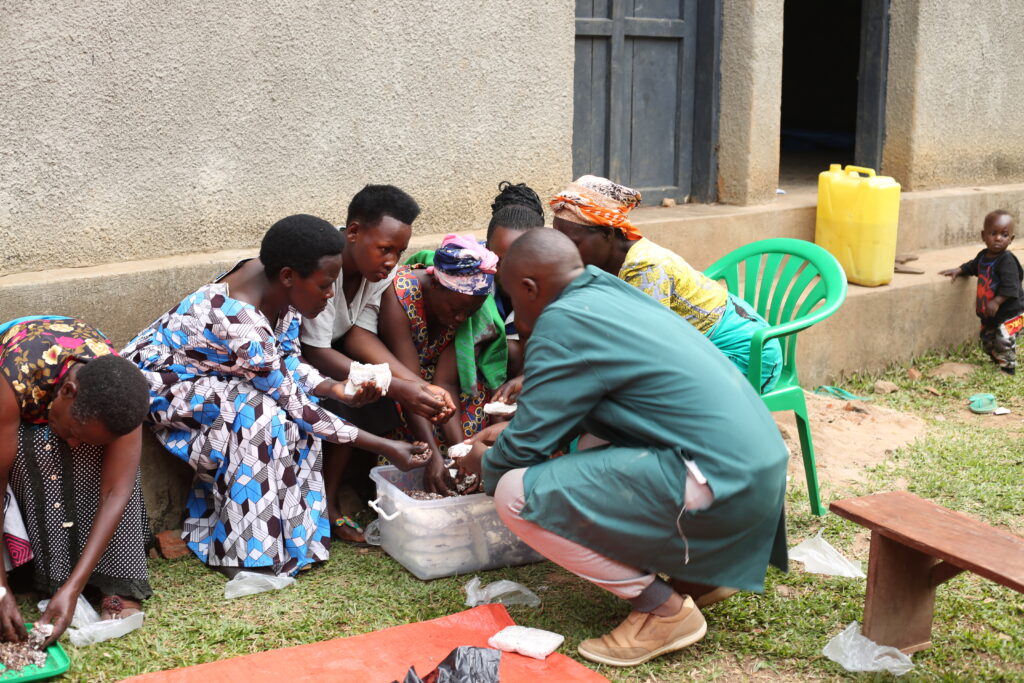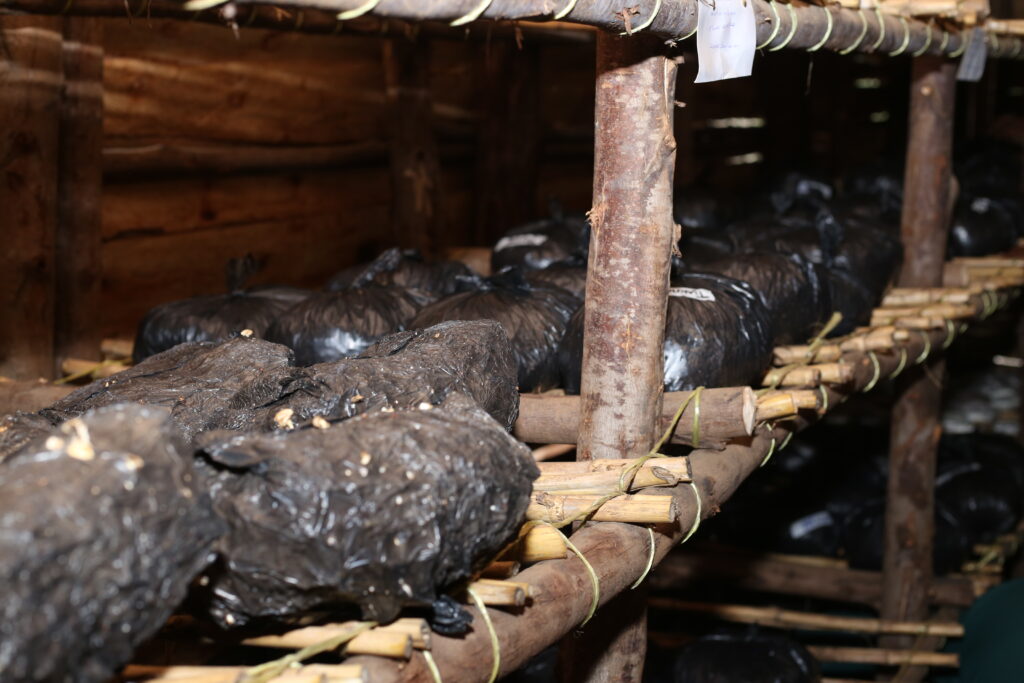Shifting Narratives:
Journalist Takes To Farming, Changes Stories Of Rural Women
Written by: Rhonet Atwiine. Documentary Report by: Rhonet Atwiine. Film & Photography by: Richard Mugambe.
Written by: Rhonet Atwiine. Documentary Report by: Rhonet Atwiine. Film & Photography by: Richard Mugambe.
Myres Ndyabawe graduated from Makerere University with a Bachelor of Journalism and Communication in May 2021, alongside 86 other students.
As others took to the streets to look for white-collar jobs, he moved on to pursue a different path, one that would involve a collective transformation of lives in his rural community of Kabuga town council in the western district of Kamwenge.
Ndyabawe knew quite well that agriculture was his community’s cash cow, yet many people were struggling to make much out of it.
“I realized that my community heavily relied on farming, and I felt I could contribute by trying my hand at it too in a different way. I thought about mushrooms because they take a short period of time to mature, and it would put money in people’s pockets easily,” he says.
After consultations with friends, he realized they were viable, and also discovered that the fungal plants, which are now a delicacy in Kampala’s leafy spaces, could be cultivated using agricultural waste—an abundant resource in rural areas.
He went home to mobilize women, who are the community breadwinners to collectively grow mushrooms as a commercial activity in what he termed as Simbula Ventures.
The Simbula Ventures Initiative now unites women from different communities and trains them in mushroom cultivation, paving the way for a fresh start for themselves and their families.
“We provide hands-on training that is physical, interactive, and conducted at our farm, where we gather and mobilize these women. The theoretical aspect covers the importance of mushrooms, marketing strategies, and essential dos and don’ts. The practical sessions delve into the cultivation process of mushrooms.
Adding that unlike crops like beans and maize, mushroom growth isn’t affected by weather, reducing potential losses. Mushroom cultivation doesn’t demand much time, allowing women to pursue other activities alongside it,” Myres explains.

A trainer takes women farmers through how a mushroom variety can be propagated. Courtesy Photo.
Eric Mbonigaba, the local council member (LC1) at Kabuga village, says such an initiative was timely because women in his community lacked diverse income sources, leaving many families impoverished.
Additionally, the community struggles with the lack of a stable food supply, particularly in terms of sauces, as they primarily depend on perishable items like beans, which can spoil quickly
“You find that some families rely on Green Amaranth locally known as ‘doodo’ which is only available during the rainy season. Yet if they interest themselves in mushroom growing, they would benefit,”
For women in rural communities of Kamwenge, mushroom cultivation offers a lifeline to economic empowerment
Judith Kyomuhangi and Lydia Mugyenyi are just two examples of the inspiring women from Kakinga and Kibogo who attest to this transformation.
“I’m able to earn extra money now because I no longer struggle to save. Plus, I don’t feel pressured by the members of the savings group anymore, as I can contribute any amount they request,” Judith shares.
“Now, I can afford to buy essential items for myself and my grandchildren,” Lydia elaborates, expressing how her newfound income has positively impacted her ability to provide for herself and her family.

The process of mushroom cultivation itself is straightforward yet transformative.
To begin, Myres explains that they gather agricultural waste and chop it into smaller pieces that are soaked in water overnight.
On the following day, the soaked waste is packed into a sack and steamed for three hours. Once steamed, allow the waste to cool down.
On the third day, sow the mushroom seeds onto the cooled waste.
Then, patiently wait for 14 days before beginning to water the seeds. After four days of watering, you can start harvesting the mushrooms.
“This simple process allows for the efficient cultivation of mushrooms using agricultural waste, providing a sustainable and environmentally friendly approach to farming. The steps yield bountiful rewards in just 18-21 days, so you can not lack sauce for food,” Lydia explains.
Ndyabawe points out that the mushrooms they harvest can be sold for prices ranging from Shs7,000 to Shs10,000 per kilogram. This provides a profitable income opportunity for the women involved in mushroom cultivation.
“The first thing you see is hope. Women are now motivated to run their initiatives with hope of improving livelihoods. Then women are now able to earn without waiting for three or six months to harvest beans and maize respectively,” he says
The impact extends beyond economic empowerment. Mushroom cultivation fosters a sense of community cohesion and well-being. As women come together to learn, share knowledge, and support each other.
“Looking ahead, my vision is clear: to empower more smallholder farmers, increase production capacity, and add value to products,” he notes.
However, the journey isn’t without its challenges.. The limited purchasing power within the community results in lower earnings from the nearby market. Additionally, acquiring spawn from Kampala incurs transportation costs, further increasing the production expenses.
Ndyabawe and his team are committed to sustainability, recognizing that true progress lies in harmonizing economic growth with environmental stewardship and social equity.
“In Simbula, the fungus among us is more than just a crop—it’s a symbol of possibility and transformation. As women cultivate hope in their communities, the ripple effects of their efforts resonate far and wide, shaping a brighter future for generations to come.” he concludes.
© 2022 - Media Challenge Initiative | All Rights Reserved .
© 2022 - Media Challenge Initiative | All Rights Reserved .